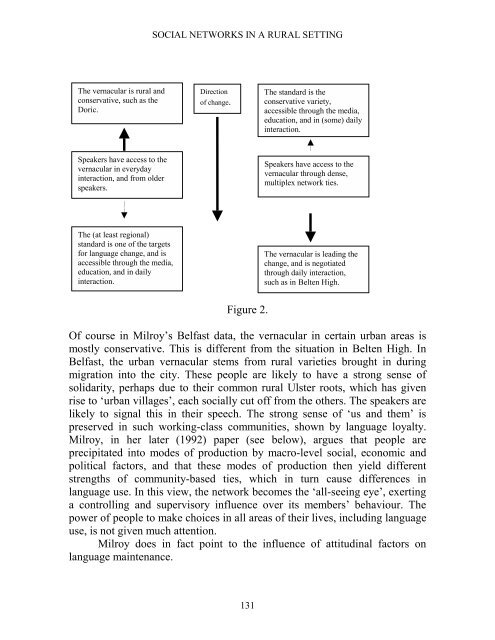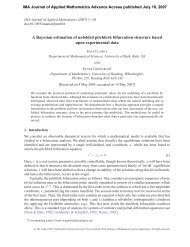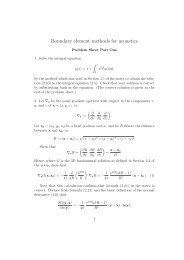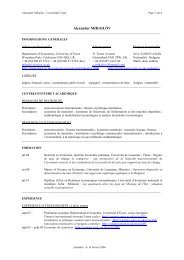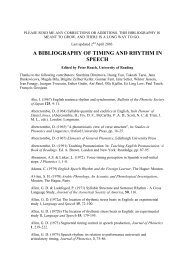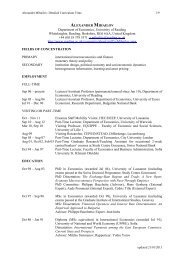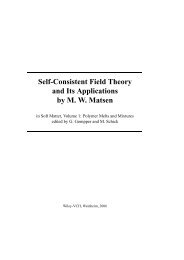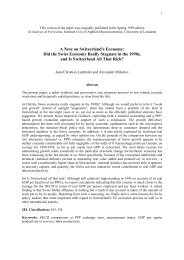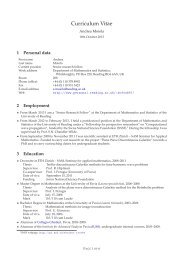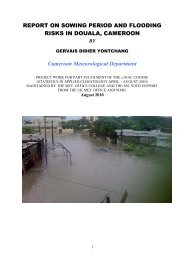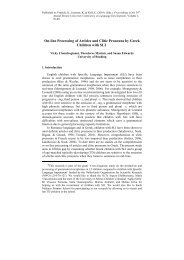Reading Working Papers in Linguistics 4 (2000) - The University of ...
Reading Working Papers in Linguistics 4 (2000) - The University of ...
Reading Working Papers in Linguistics 4 (2000) - The University of ...
You also want an ePaper? Increase the reach of your titles
YUMPU automatically turns print PDFs into web optimized ePapers that Google loves.
SOCIAL NETWORKS IN A RURAL SETTING<br />
<strong>The</strong> vernacular is rural and<br />
conservative, such as the<br />
Doric.<br />
Direction<br />
<strong>of</strong> change.<br />
<strong>The</strong> standard is the<br />
conservative variety,<br />
accessible through the media,<br />
education, and <strong>in</strong> (some) daily<br />
<strong>in</strong>teraction.<br />
Speakers have access to the<br />
vernacular <strong>in</strong> everyday<br />
<strong>in</strong>teraction, and from older<br />
speakers.<br />
Speakers have access to the<br />
vernacular through dense,<br />
multiplex network ties.<br />
<strong>The</strong> (at least regional)<br />
standard is one <strong>of</strong> the targets<br />
for language change, and is<br />
accessible through the media,<br />
education, and <strong>in</strong> daily<br />
<strong>in</strong>teraction.<br />
<strong>The</strong> vernacular is lead<strong>in</strong>g the<br />
change, and is negotiated<br />
through daily <strong>in</strong>teraction,<br />
such as <strong>in</strong> Belten High.<br />
Figure 2.<br />
Of course <strong>in</strong> Milroy’s Belfast data, the vernacular <strong>in</strong> certa<strong>in</strong> urban areas is<br />
mostly conservative. This is different from the situation <strong>in</strong> Belten High. In<br />
Belfast, the urban vernacular stems from rural varieties brought <strong>in</strong> dur<strong>in</strong>g<br />
migration <strong>in</strong>to the city. <strong>The</strong>se people are likely to have a strong sense <strong>of</strong><br />
solidarity, perhaps due to their common rural Ulster roots, which has given<br />
rise to ‘urban villages’, each socially cut <strong>of</strong>f from the others. <strong>The</strong> speakers are<br />
likely to signal this <strong>in</strong> their speech. <strong>The</strong> strong sense <strong>of</strong> ‘us and them’ is<br />
preserved <strong>in</strong> such work<strong>in</strong>g-class communities, shown by language loyalty.<br />
Milroy, <strong>in</strong> her later (1992) paper (see below), argues that people are<br />
precipitated <strong>in</strong>to modes <strong>of</strong> production by macro-level social, economic and<br />
political factors, and that these modes <strong>of</strong> production then yield different<br />
strengths <strong>of</strong> community-based ties, which <strong>in</strong> turn cause differences <strong>in</strong><br />
language use. In this view, the network becomes the ‘all-see<strong>in</strong>g eye’, exert<strong>in</strong>g<br />
a controll<strong>in</strong>g and supervisory <strong>in</strong>fluence over its members’ behaviour. <strong>The</strong><br />
power <strong>of</strong> people to make choices <strong>in</strong> all areas <strong>of</strong> their lives, <strong>in</strong>clud<strong>in</strong>g language<br />
use, is not given much attention.<br />
Milroy does <strong>in</strong> fact po<strong>in</strong>t to the <strong>in</strong>fluence <strong>of</strong> attitud<strong>in</strong>al factors on<br />
language ma<strong>in</strong>tenance.<br />
131


